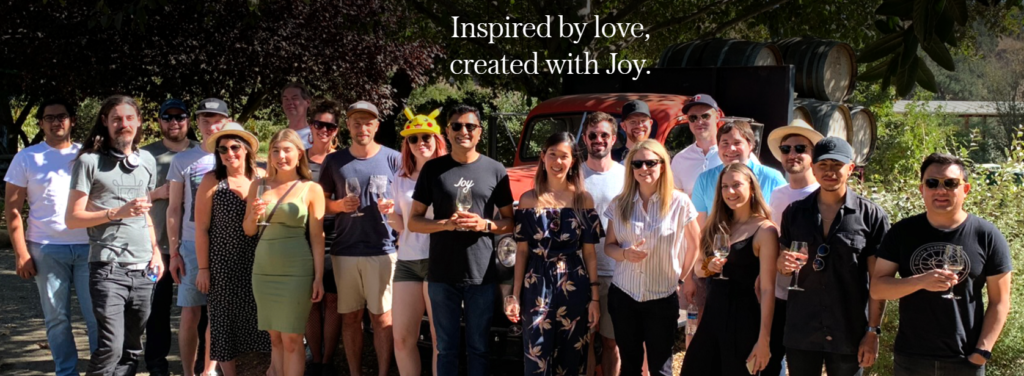Raj Girn: Please welcome to the show my good friend Vishal Joshi, who is the founder of Joy, an innovative online wedding company that gives couples a smarter way to plan their big day.
This is Part Two of our conversation:

Raj Girn: I want to go on a bit of a journey with you, if I may, just to kind of get inside of your headspace for anyone out there that feels that they have a big idea. I would like to kind of give them some of your experiential wisdom. So we’re taking a concept from idea to scale is a huge undertaking, not to mention doing it in an industry that most perceive to be oversaturated with options already. And we kind of feel that pretty much every industry already has solutions. And it becomes more difficult to figure out what that big idea was.
So for people who are deterred from entering similar oversaturated industries, of which most of them are today, what would you say to them in terms of the due diligence they should do to see if, in fact, there is a gap in the marketplace that could be filled by the next big idea? What would be some of the things that you would recommend they do?

Vishal Joshi: That’s a wonderful question. Honestly, it’s a very good question. Let me replay it just to make sure that I’m getting it right.
Absolutely. To make sure that there is, in fact, room and there is a gap in the marketplace for their idea.
Yeah, I think so. Number one, I would say is to make sure you’re doing it for the right reason. The right reason cannot be money, unfortunately, because you will not get it unless and until you really have the right result. Like if you really think there’s a negative space, which you do not think is being met by anybody, you really have a burning desire to do it. So I think that’s number one.
Number two, I would say, is to truly think that is this market big enough? There are lots of small, oversaturated markets and you don’t want to be in a small, oversaturated market. But a big, oversaturated market sometimes has room for multiple players and has an opportunity when something is oversaturated. It already is signalling that there is value to be created, which is the reason why so many people are trying to, either it has a lot of problems or a lot of value to be created, or both and ideally both.
“A big, oversaturated market sometimes has room for multiple players and has an opportunity when something is oversaturated.” ~Vishal Joshi
But in that situation, you want to make sure that it is really, really big as an example for weddings. It’s a $500 billion market worldwide. Forty-two million couples get married each year. So it’s a big market. And so even if you basically, are able to get a percentage of the market, you still will be big enough. You will have an opportunity to be able to do so. Second, I would say, is the market really, really big enough?
Number three is to do what you respect. The customer, the competition. So it’s very easy to just put on somebody else or they don’t know what they are doing. Their execution is weak there. This is weak. They don’t have design. They don’t have technology, whatever that might be. That’s just wrong because you just have to think about it, that someone who left something cushy to start something just like you. Has something going on in their head are smart, like you cannot under-appreciate your competition to fully understand them, embrace them and give them the benefit of doubt, give them the benefit of the doubt that they have done everything that you might possibly be thinking about. So that’s another important thing: respect your competition.
And then I think number four is do not think start-ups are like flipping a house. This might seem comical, but I think many people believe that. Like, I will come in, I built something and in two years it will be like blah, blah, blah, and then I’ll sell it and I’ll have so much money. That is very, very wrong. Why do people compare start-ups to the quintessential lemonade stand? It’s because start-ups are that lemonade stand when you are actually dreaming to make a global multi-chain restaurant. When you’re starting as a lemonade stand, your start-up is a lemonade stand. You think that it is going to take that much longer to build it into a multinational chain. So under-appreciation of how long it takes for something to work is a very big problem.
And if you’re in an oversaturated market, it is furthermore harder. Because you have to cut out the noise. Just don’t think that building a start-up is like flipping a house. And lastly, very important is you have to actually have a unique mode, like something which is fundamentally different, which even if one of your competition hired someone just as smart as you they would still not be able to do much like if you just think that you are the IP, you are the strongest person.
Like, imagine there was someone just like you. If they hired that person, would they be able to take you down because incumbents in an oversaturated space are very, very thick. And you cannot just wake up and say, I’m going to build an operating system and beat both Microsoft and Apple. You just don’t wake up and say that. You have to have something which is just so fundamentally different than everybody else. And you have to be honest to your mirror, not just say this is because I’m good, because my angle is good. Well, they will copy your angle in two days, then. So I think when you want to approach the oversaturated market, I think I would probably say those five things. It’s actually like, let’s repeat them.
So number one, I would say do it for absolutely the right reasons. Don’t do it just for making money. This is going to be a very long journey. Number two is that if the market is not big enough for you, it’s not worth the squeeze you hold. It might not be what number three is that are you really respecting what your competition is doing? And that’s number three. And I think four would be that it’s not a small job. It’s a long job. It’s like a lemonade stand to a multinational restaurant chain.

And you have to believe that you have to have something which is so unique that it will take a very long time for someone to replicate. Like we’ve spent like six years building Joy. Even if I give you 10 examples, I’m not worried because I have 500 of those which I have paid attention to and fixed for discover and fix. All of them is going to take someone a very, very long time. So, yeah, I think that you’ve got to have a moat. So I think that before you enter an oversaturated market, you should give these things a thought.
So say, for example, a person checks off on all of these things, what do you think maybe one or two things are that they should ensure is in place to set themselves up for success? What would that next stage be after doing all that research and getting that out of the way?
My advise is reveal your secrets. I know it sounds funny, but I say this often. Many founders and entrepreneurs just hold secrets very close to their heart and they don’t want to tell anybody because that idea is going to be stolen and somebody is going to take it away and they should just build it and make it perfect and then tell anybody anything. The thing is, the risk of not talking with people is so high and the chance of someone copying your stuff is so low.
And let’s take an example. Imagine the Airbnb founders, Brian and Joe and those guys, they came to anybody like around 10, 12 years back and said, “You know what, I have a great idea. I’m going to have people come in and sleep on an air bed in the extra bedroom that I have. Strangers could do it and they will pay me money for it.” Even if you heard it, you wouldn’t do it. Like why would I do this thing? This is stupid. If those ideas don’t always feel logical at the very beginning, they just morph and they mature. And so what I would say is that’s an important thing.
Like there are many examples. If somebody came and told you, I will create a software which will allow you to type 140 characters and throw it into the ether and everybody else will listen and follow me, you will be like, good luck. But you have Twitter now. There are so many examples like that. But if you go and talk and hear the perspective of people whom you are solving this far, it would give you so much benefit. It’s underrated. The complete story is just listening to people for five years and it’s going and telling people that this is what I’m building. What do you think? Go to Starbucks and tell someone what do you think? I’m doing this. Just talk to people and run things by them. Strangers have no reason to please you.
I think that’s the number one thing just talk to a lot of people and in some way don’t have a solution that is waiting for a problem. And let me underscore what I’m trying to say. You have an idea and you think it solves the problem. And then you basically go to somebody and you say, what if I build this? Would it be cool that guess what they’re going to say? Yeah, it would be cool. They don’t want to basically make it sound like it’s not cool. They’re going to say, of course. So no matter what, you’re going to if you go with the solution and just ask people, will this work? The answer is always yes. Human beings just don’t want to disappoint other people. So you have to go and do what we call problem interviews, not solution interviews.
“Human beings just don’t want to disappoint other people. So you have to go and do what we call problem interviews, not a solution interviews.” ~Vishal Joshi
I love that.
Like if you’re trying to build Airbnb, you will probably be like, “Well, when you go to someplace what are the kind of problems that you face?” And maybe people will say, “I don’t really want to spend that much when I go to that place. I just wish that there was someplace I would just like to camp for one night. Maybe a hostel would be fine. I would share a room with someone.” That’s when you listen to a lot of those things. Or maybe you are building Twitter and people would be telling you that, “I have this insight which I feel I would just share and like-minded people would basically debate about it or talk to me about it, or we could form this community of strangers.” Maybe you heard all that stuff. And then you come up with a solution that everybody is going to say, “Yeah, that’s a great idea.”
We are building wedding planning solutions. We don’t have to come up with a solution and go. We just go and listen to the brides, what problems they have, and then we come up with the solution that works across the board. I think just talk. Reveal your secrets, just reveal them. Just go and talk to people because that’s less risky. Nobody has time to leave all the stuff which they are doing, live their dreams, leave their ideas to go behind yours.
And building is too hard. It’s too hard for someone to want to steal your idea just because you have a good idea. So let me ask you this: So you get to a certain point where you’re starting to see that there is proof in your formula, right? It’s working. Fundraising becomes a big part of the scale game. As you know, you’ve done it on a couple of occasions there. And there’s so many ways to do it. But before we tackle that particular part, I just do want to mention this for everyone, that Joy recently raised $20 million dollars for the next phase of growth.

So, first of all, Vishal, a huge congratulations, because I know that you’ve worked tirelessly with your team to bring the company to this point. So I want to ask you this: How do people know how to raise money? And what I mean by that is you got to come up with the number. You know, this is the number I need and this is what this number needs to accomplish for me. How, through your experience have you done that? Because I feel this is where a lot of start-up founders fail is they don’t scale properly and they don’t bring in the right amount of money, whether it’s too much money or too little. Talk to me a little bit about your experience in that, because I’m hoping that anyone that’s listening, watching or reading this can kind of take heat on your experience here.
Thank you for the wishes. It was a good milestone, a great milestone. I think it’s hard sometimes, it’s hard to even think that we were in my friend’s garage a few years back and now we’ve raised over $46 million dollars.
Wow. And before that, Vishal, before that you were living in a household of an income. That was extremely. Unheard of in the western world, so let’s let’s at least remind people where you actually came from right now. This has been an incredible journey for you, but one that I know that you’ve worked extremely hard to get to.
Yeah. And I think why I why I provided that is that it is not because we we raised the money that I would, first of all, ask people whether they really do want to raise money, because it’s a very fundamental question that you when you raise money, you’re building a specific type of company. And I think founders have to fundamentally understand that raising money is not equal to success, but we glorify it a little too much. It’s like, oh, there is more money. It’s kind of a reward for what you’ve done. But it’s not really the first step. I would say people should think the first thing that people should truly think about is that. If you want to build a company which actually will give good returns to you as a founder, it doesn’t really need to raise money.
“I think founders have to fundamentally understand that raising money is not equal to success, but we glorify it a little too much.” ~Vishal Joshi
Like if you can make something which makes money on the zero, which is usually the case when you build any enterprise product where companies are paying for it, you can start with a very simple product which someone is willing to pay for, and you don’t really need to raise money. It’s only only when you have consumer companies which are not going to make money for a very long time or what we call it, as the hot tech companies like trying to cure cancer, like things like that, like it requires just a large amount of capital to even get started. Hardware startups at another one. If you want to build hardware, it takes a lot of capital. But if you can build a company that doesn’t need capital first, I would say do that, OK, because that fundamentally gives you a very sound business principles at the very beginning of your company.
Right. And so I guess I’m doing something right here Vishal.
You know, really, really good. I think that this glorification of Yodlee, like raising money equal to success is not. True or not good, I don’t feel extremely successful because of raising money, but I have learned to say thank you to everybody who congratulates us because that’s our culture and I feel like we have so much more work to do. So now, going back, assuming that you need to raise money. Right. Usually, the way to look at it is that let’s say there are three points on A, B and C one day and you want to go to point C, what usually you would have to do is you will have to somehow reach point B without any help.
And then convince people that, look, I came from A to B, I can do this. And now to go from B to C is where I need money and this is where I need money. V As an example, we launched like during the during the pandemic, we when we were hard at work, our industry was one of the first hit. We spent all the time trying to build the gift registry product and we launched it this march and still during a pandemic. And it has grown phenomenally like it grew like hundred percent month over month in revenue.
It grew by double-digit Veeco or week in revenue, adding up to one hundred percent month over month from like almost no revenue to like many, many tens of millions of dollars of revenue. We just grew quickly. And then what we realized is that in order for us to scale this success to a bigger level, we have to start doing marketing and we need some marketing, even though the money will come later once people start using it to. But we need to market it and all. We need some money right now to be able to do that so that we can show more progress towards our point. See, and that’s the reason why we came to be just building the product and showing that it works and telling the world that we want to go to see and we can go with this money and therefore we need this money and that.

That is basically when people will give that they want to believe that you can go to this next point, otherwise you just say like, well, I want to build a startup that will cure cancer and I need like one hundred million dollars, like, I can say that. But it means nothing, right? No credibility to say that.
So I would just say that many people spend quite a lot of time trying to meet with quite a lot of investors and keep hearing, you know, so many number of times I hear No. Two, it’s no special thing. But the point at that that thing is that when you go and speak with these many investors, if you take the same amount of time and instead of raising money, you spend that time trying to get to a point where raising money is easier. It sounds crazy, but like three months that you would spend talking to investors are better spent talking to your customers and fixing your product. Agreed. So that your numbers look so much better and easier to raise money, you know.
So what is your like? So you just raised another 20 million dollars. What is your see? What people have, what do people have to look forward to with Joy? What is your see?
Yeah, so I think what we wanted to do, number one, is that we want to make we want people to just know about us now, like we want to make this product. But mostly it has gone completely out of luck. So we now want to spend the time to let people know about us.
I don’t know how you did it, but I just I it makes me smile. It makes me smile to know that you did this during covid and without marketing, it’s just brilliant. It just goes to show like, how huge guys, I hope you listening to this, how huge of a gap in the marketplace that must have been in what normally people would perceive to be a very oversaturated, you know, market that’s been around for as long as humankind.
But there it was this unique idea, those five different points that Vishal mentioned earlier. You got to rewind this back. You’re gonna write that down, because that for me, is kind of the ground zero of the value system that you need to create when you’re going to the drawing board to figure out if you do, in fact, have the next big idea for a gap in the marketplace big enough in any industry. Like is there anything else you want to add to that before I get ready to close this off, which, you know, is like so sad because I feel like I have so much more to ask, which means I’m going to have to bring you back on.
One, am thankful that it is adding value. And I think we we talked so much. I hope it was somewhat useful.
Very useful Vishal.
Yeah. And I think as a parting message, what I would say is that like, we worked very hard to use technology, which was our strength to solve problems, which were our family’s problems, like wedding planning, stress. If you can find something which is personally calling to you and appealing to you, then it it helps. And you are through a lot of difficult times. And and otherwise, just like hopefully you check out with Joy.com and you tell everybody to use it. We are we are hoping to start marketing. So we will also try. But if you are if you can help, we will really appreciate it.
“We worked very hard to use technology, which was our strength to solve problems, which were our family’s problems, like wedding planning, stress. If you can find something which is personally calling to you and appealing to you, then it it helps.” ~Vishal Joshi
Absolutely. And guys, you heard officials say earlier on as well that, you know, this is like any event that you guys are planning, all of the kind of tactical solutions that come with the experience of joy is really for any event that you may be planning. I mean, I love that. I cannot wait to see, you know, just the iterated, expanded diversification of what you do with this when you go to market, because although the idea was to solve the problem for that one friend of yours, I think this is going to solve the problem for everyone that is planning any type of event.
So I do recommend that everybody go and check that out. Cannot wait to see what else you’re going to be doing and what you and your team have up your sleeve. So you do need to come back on and share that with me. But before I let you go, Vishal, I want to ask you this. Clearly, building anything is an uphill trek. What has kept you motivated and kept you going, especially during those times when you felt like everything just wasn’t working? Like, can you give some words of wisdom there for people?
So I think for us, surprisingly, it never really felt like things were not working, and it is not really that it never was true, but it was mostly a minor hacking of some sort. So you can think about it that problems are not in my control, but relations are right.
And if you’ve spoken like a true engineer.

But I think the thing is what happens is that, like, if you have all these different issues which are which you’re facing, if you find the most important issue and you just ask yourself this question. What is it that I can do to make this issue go away? Maybe it will not go away completely, but remedy it a little bit, right. The one most important thing when everything is caving in.
Where is that crack of light that you can go towards? And usually that’s what gets us very busy. Oh, things are not working. Maybe if we do just this one thing. There is a chance it would work. So let’s just do that one thing. Then you just get busy doing that one thing. And then once you do that, then you realize maybe this one other thing. If you do that will probably make it better to and instead of just like. It’s sort of just like getting bogged down by like, oh, things are not working, we just have always gotten busy on what can we do to make it work.
Absolutely. So it hasn’t been something that you’ve sat with in your head. It’s been something that you’ve sat with in, you know, with the mindset of finding a solution. And I think that that really is the key message that I’m hearing you say here, Vishal, and I want to close off by asking you, what do people need to take away from our discussion today about how to scale your big idea online in an oversaturated industry? What how would you encapsulate that?
I think. I’ll go back to a few of the points that probably we talked about before, but if you’re about to enter an oversaturated industry, it obviously is a good sign, one that it is oversaturated. So the problem exists or the solution has enough value. But if you get in without thinking, what is the reason you are getting it like and is your what if you get in without truly understanding your competition or respecting them or if you get in without truly thinking how big this market is or without really thinking how long it is going to take or without thinking really like do you really have a model?
“If you’re about to enter an oversaturated industry, it obviously is a good sign, one that it is oversaturated. So the problem exists or the solution has enough value.” ~Vishal Joshi
You really have a unique thing that nobody else can do. It doesn’t go in without that, like otherwise it just becomes very, very hard and life is precious. If you have to spend 10 years of your life to solve one problem, ask yourself, is this the problem? Right. Literally, that is the question you should probably ask if I have to spend 10 years of my life to solve. One problem is this that problem. If it is, then it is. It is wedding planning for us. We are having a lot of fun.
Oh my gosh. You definitely have had so much fun listening to kind of all of your experience, your wisdom, your insights that you’ve been sharing with everyone. I absolutely know that everyone’s going to get a tremendous amount of value from this. Thank you so much for joining me today and sharing your wealth of wisdom. I look forward to bringing you back on when you break unicorn status, my friend.
Someday you saw so much. I really appreciate you taking the time and thank you for all the good work that you are doing because I and I hope that I can help in any way.
Thank you so much. I absolutely respect and appreciate you. Thanks for hanging out with Vishal and I today, folks. I really hope that you got some true value from our discussion and that you understand that you are just an idea away from changing lives, as Vishal has and continues to do. So think about a lot of these things that Vishal has shared through his own experience and his team’s experience.
And if any of what we have been talking about today helps you with your big idea in the future, I want to hear from you guys. Email me at [email protected]. Let me give you that again: [email protected], as I’d love to to you in the future. Show and talk about your story.
For more trainings like this, please subscribe to the YouTube channel at The Open Chest Confidence Academy. I want you to also go check out the podcast platforms, Apple, Google and Spotify, where you can search the show under the Transform Your Confidence show. And I also encourage you to join our free coaching newsletter Community. Just head on over to the website and then /newsletter. And finally, if you’re looking for some support on some of the things that you’re going through, that is within my wheelhouse, which you guys know is mindset, branding, communications, media, marketing, leadership and networking. I want you to go join my free professional development incubator where I personally answer those questions for all of my members. Go to Facebook at the Transform Your Confidence Group.
And until next week, I’m sending you positive vibes to keep you focused on building your brand, your authority and your best life. See you next week.












